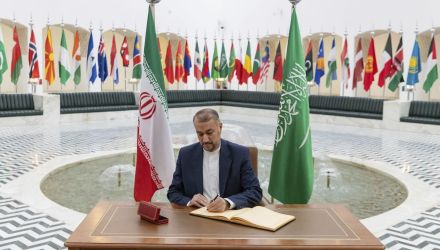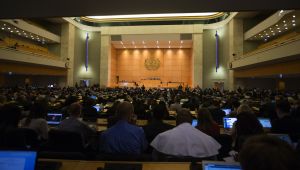To paraphrase Vice President Joe Biden, this was a "bleeping big deal." With all the immediate challenges demanding President Obama's attention today, his choice to invest so much of his own mind-share and political capital in an issue seemingly so remote is remarkable.
We are accustomed to the triumph of the urgent over the important. In assembling the largest number of heads of foreign governments by an American president since FDR invited leaders to San Francisco to create the United Nations, this president demonstrated his ability to distinguish between the vivid and the vital.
The question remains: So what? How is the world different today? How will it be different a year from now?
To score this undertaking, it is necessary to assess performance on four dimensions. First, what is the single largest national security threat to the lives of American citizens? Far-fetched as it still appears to many, President Obama's answer is unambiguous. As he said Monday: Nuclear terrorism is "the single biggest threat to U.S. security, short term, medium term and long term."
Psychologically, it is almost impossible to come to grips with the idea that a terrorist like Osama Bin Laden could explode a Hiroshima-like nuclear bomb in New York or Washington, D.C., devastating the heart of a great city. Analytically, there is only one difference between the 9/11 attack that killed 3,000 people from 77 nations in New York, and a nuclear 9/11 that could extinguish 300,000 souls. That singular difference is terrorists getting a nuclear bomb.
Every official who has shouldered responsibility for American national security since 9/11 agrees. As Secretary of Defense Robert Gates has frequently observed, "Every senior leader is asked what keeps you awake at night. It's the thought of a terrorist ending up with a weapon of mass destruction, especially nuclear."
So on this criterion, give the president an "A+."
Second, the central question at this summit was: How can this ultimate catastrophe be prevented? The big idea the president sought to drive home is the proposition that the leaders assembled had in their hands the power to successfully prevent nuclear terrorism. They can do that by doing just one thing: denying the terrorists the means to achieve their deadliest ambitions. Imagine that all the nuclear weapons and bomb-usable nuclear materials in the world were locked up as good as gold in Fort Knox. The likelihood of terrorists exploding a nuclear bomb anywhere in the world would be reduced to nearly zero.
Thus in his central prescription, the president earned an "A."
Third, who will have to take the actions required to assure that all nuclear weapons and materials are locked down to a gold standard? The governments assembled. The painful but undeniable fact is that 99 percent of the actions required to secure all nuclear bombs and materials beyond the reach of thieves or terrorists, will be taken-or not-by foreign governments acting on the basis of their assessment of their own best interests.
The purpose of this summit was to impact those governments' behavior by: raising those leaders' consciousness about the threat nuclear terrorism poses to them; convincing them that their actions can prevent this catastrophe; and creating an action-forcing process to motivate them to take specific actions for the summit.
Here the president's broad strategy represents a new chapter in the post-Cold War campaign that began with the far-sighted initiative of Senators Sam Nunn and Richard Lugar in creating the Cooperative Threat Reduction Program that has spent $1 billion each year since the collapse of the Soviet Union eliminating nuclear weapons and preventing them from falling into the hands of rogue states or terrorists.
In preparation for this summit, a dozen states took significant additional actions to reduce the threat including Chile's removal of all of its highly enriched uranium (HEU) and Malaysia's passage of a new export law against illicit WMD trafficking. A further dozen made explicit promises to do so, including Ukraine's pledge to remove all of its HEU by 2012, Canada's commitment to send a large stock of HEU back to the United States, and Mexico's decision to convert its research reactor to use LEU fuel and remove its last remaining HEU.
Fourth, will the strategy and operational plan the president is pursuing be sufficient to achieve his objectives? My best judgment is not. This summit was Act One. Other governments are most likely to take the actions required when their leaders feel in their guts that a loose nuclear weapon in their country could be used to blow up the city in which they live. Russian President Dmitry Medvedev should not secure Russia's nuclear weapons to protect Americans from an al Qaeda attack. Rather, he should think about the Chechen separatists who recently bombed the Moscow subway getting a Russian nuclear weapon and erasing Moscow from the map. Pakistanis and Indians should think first about the consequences of a loose nuclear weapon, or material from which terrorists could make a bomb, producing a nuclear Mumbai or Islamabad.
The "Work Plans" announced at the summit commit states to do no more than "consider, where appropriate" eliminating, consolidating, or securing materials. This reflects the unwillingness of the participants to agree to anything more and the administration's deference to their sovereign prerogatives. Predictably, a communiqué that represents a consensus among such actors expresses a lowest common denominator.
But the incandescent fact is that their failure to secure bomb-usable material imperils American vital interests. While causing them to take actions essential to protect our security appropriately starts with persuasion, our strategy must utilize all instruments of American power.
Act Two will require at least three further pillars: a principle of accountability that holds states to a standard of strict liability for bomb-usable material they make, no matter who uses that material to explode a bomb on American soil; a "minilateralist" rather than multilateralist club or institution that enforces gold standard security and accountability; and prioritization of nuclear security as a "must do" in bilateral relations with states that have weapons or materials at risk.
My scorecard reads incomplete.
Graham Allison is director of the Belfer Center for Science and International Affairs at Harvard's Kennedy School of Government and the author of Nuclear Terrorism: The Ultimate Preventable Catastrophe.
Allison, Graham. “Assessing Obama’s Nuclear Summit.” The Daily Beast, April 17, 2010




